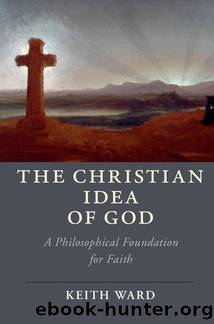The Christian Idea of God: A Philosophical Foundation for Faith by Keith Ward

Author:Keith Ward
Language: eng
Format: mobi, epub
Tags: Christian Life, Philosophy, Mind & Body, General, Religion, History & Surveys, Theology, Spiritual Growth, Ancient & Classical, Christian Theology, History
ISBN: 9781108419215
Publisher: Cambridge University Press
Published: 2017-09-28T04:00:00+00:00
Chapter 13
Eternal Mind
The realisation that we have the power to destroy our planet, but that we also have an obligation to care for its good, points to something important about the created universe. Some people have thought that if there is a Creator, and since the Creator is good, everything in the universe must be for the best âin the best of all possible worldsâ, as Voltaire put it in his novel Candide. But that is not what our world is like.
Our world is one in which new properties emerge from much simpler initial conditions. When our universe began with the Big Bang, about fourteen thousand million years ago, there was only an initial state in which there were no subatomic particles or complicated structures at all. From that state, as it expanded (or inflated) and cooled, many sorts of particles came into existence which physicists variously call particles or strings or fields of force. These were able to combine to form atoms, relatively stable structures, which in turn grouped into molecules, the basis of all the chemical elements that now exist. In the nuclear fusion at the heart of stars, heavier and more complex molecules were forged, and over aeons of time the amazingly complex structures of RNA and DNA, the basis of organic life, came into being. DNA is a code for building physical bodies in plants and birds and animals, and on this planet (and maybe on countless others) huge diversities of plant and animal life developed.
We now know that this development largely occurred through the mechanisms of mutation (changes in the make-up of DNA) and selection (the adaptation of organisms to their environment, which enables them to reproduce successfully). By the repeated application of those mechanisms, eventually some animals formed central nervous systems and brains. And finally, on the planet earth, the neocortex was formed in humans and for the first time enabled conscious intelligence and responsible freedom to exist.
This story of cosmic evolution is one in which over time more complex and more organised structures evolve by natural mechanisms and have ended up (so far, and on this planet) with intelligent, conscious life forms â human beings. It is possible that this has been a long sequence of accidents and purely chance occurrences. But that does seem hugely unlikely. It looks as if even at the beginning there was an inherent potentiality for consciousness, that the âproperâ way for the universe to develop was for it to realise gradually its true inherent potential.
Humans may belong to very early stages of the cosmic evolutionary story. But they are minds, with the capacity to understand, formulate, and realise values (worthwhile states). That gives them a special place, a special responsibility, to understand and direct their small bit of the cosmic process. They can understand where the universe is going and help it go that way.
Where is it going? As far as human imagination can foresee, it would be a worthwhile goal of the cosmic process to culminate in states that are of value just for their own sakes.
Download
The Christian Idea of God: A Philosophical Foundation for Faith by Keith Ward.epub
This site does not store any files on its server. We only index and link to content provided by other sites. Please contact the content providers to delete copyright contents if any and email us, we'll remove relevant links or contents immediately.
What Is the Gospel? (Foreword by D. A. Carson) by Greg Gilbert(779)
Daily Strength: Devotions for Bible Believing Study by Douglas Stauffer & Andrew Ray & Rick Quatro(740)
Veritas: A Harvard Professor, a Con Man and the Gospel of Jesus's Wife by Ariel Sabar(641)
New Morning Mercies by Tripp Paul David(637)
The Practice Is the Path by Tias Little(630)
Christian Ethics by Wilkens Steve;(571)
Cleaning Up Your Mental Mess by Dr. Caroline Leaf(544)
Greatest Mystery in the World by Og Mandino(538)
2084 by John C. Lennox(433)
The Creative Call by Janice Elsheimer(432)
No More Christian Nice Guy by Paul Coughlin(430)
Our Appointment with Life by Thich Nhat Hanh(425)
This One Wild and Precious Life by Sarah Wilson(417)
The Duties of Parents by J.C. Ryle(414)
Monastic Archaeology by Unknown(407)
A Closer Talk with God: Scriptural Prayers for Women by Kim Trujillo(380)
The Tale of the Tardy Oxcart (Swindoll Leadership Library) by Swindoll Charles R(370)
Jesus and the Lost Goddess by Timothy Freke(359)
I AM THAT I AM: 365 Daily Meditations by Nadine Sabulsky(359)
